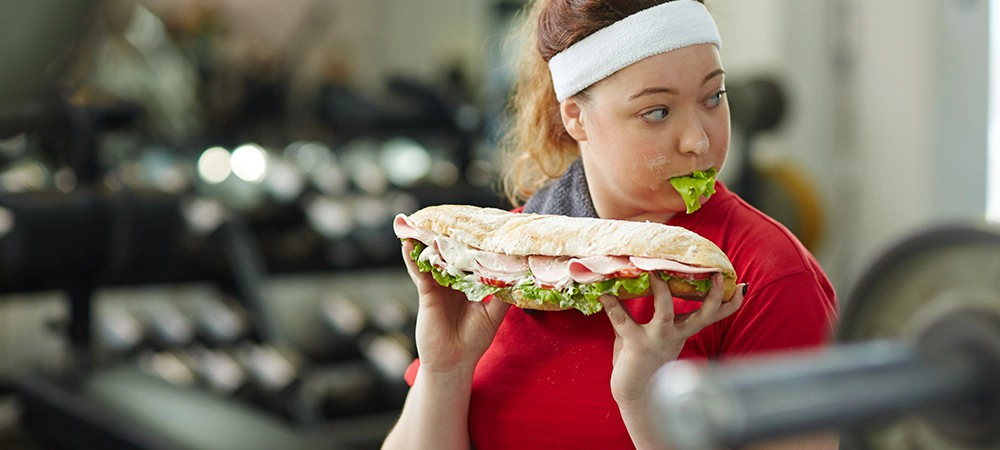Addiction happens when an individual repeats a behaviour over and over. It starts with one exposure to the abused substance or behaviour. The body and the brain are both altered chemically as food consumption results in a release of dopamine – the “feel good” chemical that makes us feel pleasurable, happy, or relaxed. One use leads to needing more and more to achieve the same effect. Eventually, a tolerance develops, and the individual is addicted. This often starts in adolescence, or even childhood.
Research into addiction has taught us that people can become addicted to more than just drugs and alcohol. Addiction can be to many different substances, or it can be something an individual does, like gambling. From a teenager experimenting with inhalants, to a woman addicted to cough syrup, the world offers an endless supply of addictive substances, including food.
If we know from research that people abuse more than just drugs and alcohol, then we know that food addiction is real too. It is challenging to diagnose and to treat because it is difficult to know when it is just normal eating, and when it has become an eating disorder.
What is Food Addiction?
Food addiction is like any other substance abuse disorder in the sense that it starts with one use and gradually turns into an addiction. In this case, the substance abused may be large amounts of unhealthy food high in fat, carbohydrates, sugar and/or salt, or it could be a particular food or class of food. The food triggers the same pleasure centres in the brain as heroin or cocaine.
People addicted to food generally eat much more than what is required to satisfy daily nutritional requirements. They compulsively consume unhealthy foods that are high in fat, or a specific food that brings them comfort or triggers a release of dopamine.
Binge eating is a recognized eating disorder and it is difficult to treat. With heroin or cocaine, the patient can go through detox to rid the body of the addictive substance completely, and begin to heal. Food is different: people have to eat in order to survive, so it is impossible to completely wean the person from the substance they are addicted to.
By consuming large quantities of foods that are generally unhealthy in excess, individuals who are addicted to food get the same pleasurable feelings that users of illicit drugs get. Therefore, they continue eating even when they are not hungry any more. This perpetuates the unhealthy behaviours and a person must eat increasingly more to become satisfied.
Like any addiction, this has negative side effects on physical and mental health. Problems include:
- Digestive issues
- Heart disease
- Obesity
- Low self-esteem
- Depression
- Isolation
Individuals who suffer from this eating disorder are at as much risk of harm as someone addicted to cocaine or heroin.
What Causes Food Addiction?
A combination of several factors work together to trigger food addiction. An individual may develop an addiction because of physical, psychological or social factors.
Physical causes may include hormone imbalances, abnormalities in the brain structure, or side effects of medications. There is some evidence that food addiction runs in families, but it is unclear whether this is primarily due to genetics or modelled behaviour.
Psychological factors include emotional or sexual abuse, being a victim or survivor of a traumatic event, impaired ability to cope with negative situations, chronic low-self esteem, or experiences with grief or loss. These factors manifest in the brain and may lead an individual to seek comfort in food in order to ease the pain.
Social reasons that trigger this food addiction may include disturbances in family function, pressure from peers or society, social isolation, child abuse, lack of social support, and stressful life events.
Food addiction is a complex mental health issue that also presents with other eating disorders like bulimia, or mental health disorders like depression.
Early Signs to Watch For

Food addiction develops very quickly, which makes it difficult to manage. Those experiencing it will display at least some of the following symptoms:
- Consuming more food than one can physically tolerate
- Eating to the point of feeling ill
- Going out of your way to obtain certain foods
- Continuing to eat certain foods even if no longer hungry
- Eating in secret, or hiding food
- Avoiding social interactions, relationships, or functions to spend time eating certain foods
- Difficulty functioning in a career or job due to decreased efficiency
- Spending significant amounts of money buying certain foods for bingeing purposes
- Decreased energy, chronic fatigue
- Difficulty concentrating
- Sleep disorders, such as insomnia or oversleeping
- Restlessness
- Irritability
- Headaches
- Digestive disorders
- Suicidal ideations
It is important to identify these symptoms when they first appear because this eating disorder develops so quickly. Intervention that happens in the early stages of the addiction has the best chance of being effective. If the addictive behaviour is left to continue unchecked, the symptoms listed above will become more frequent, intense, and long-lasting.
Another reason early treatment is important is that the addicted person cannot simply give up food because they need it to survive. Instead, the individual needs to be guided through the process of developing a healthier relationship with food that will enable them to eat – and even to enjoy eating – without this being an addictive behaviour.
Getting Help
Like any substance abuse disorder, food addiction must be treated by a team of professionals. The research on food addiction is still developing as the medical profession works hard to understand it, but there is help available. Addiction Rehab Toronto does not only treat drug and alcohol addiction: we also treat food addiction in a way that is both compassionate and comprehensive.
Our food addiction treatment program places a strong emphasis on nutrition, as well as physical and mental health. Our registered nutritionists will help you learn about the foods that are right for you, and our medical staff will help you regain the physical health that may have suffered during your addiction. At the same time, our counselors and therapists will work with you to explore the underlying causes of your food addiction.
For more information, or to book your spot in our program, give us a call.







